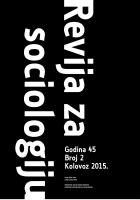Hijerarhija i borbe u mreži književnih kritika: operacionalizacija Bourdieuove teorije književnog polja i simboličkih borbi eksponencijalnim modelima slučajnih grafova
Hierarchy and Struggles in the Network of Literary Critiques: Operationalization of Bourdieu’s Theory of Literary Field and Symbolic Struggles with Exponential Random Graph Models
Author(s): Marko LucićSubject(s): Philosophy, Social Sciences, Language and Literature Studies, Sociology, Contemporary Philosophy, Structuralism and Post-Structuralism, Sociology of Culture, Sociology of the arts, business, education
Published by: Hrvatsko sociološko društvo
Keywords: Bourdieu’s field theory; literary field; literary critiques; inferential social network analysis; exponential random graph models; symbolic struggles in the network of literary critiques
Summary/Abstract: Bourdieu’s theory of literary field – an important part of his theoretical and empirical treatment of fields – was founded on the concept of two »spaces«:the space of positions in the distributions of capital (inherited and acquired economic and cultural capital, and social capital) and the space of position-takings,or expressions of actors in a field. By the means of those expressions, actors attempt to influence evaluation of their and others’ positions and products. Hence,Bourdieu referred to these attempts as »symbolic struggles« in the literary field.The thesis central to Bourdieu’s theory is that relations of power in a field, i.e.relations of inequality in possession of different quantities and compositions of capital, determine position-taking of actors in the field. Within the literary field, selection of the objects and content of literary critique should therefore correspond to similarities and differences in the actors’ endowment with capital.Verification of that thesis required conceptualisation and operationalization of the actors’ interactions in literary critiques. Drawing on earlier work in reconstruction of Bourdieu’s theoretical and empirical approach in the framework of social network analysis (SNA), the author aimed to show that exponential random graph models (ERGM) are appropriate for modelling hierarchy and struggles in the literary field. For that purpose, the author conducted secondary analysis of a binary network consisting of inter-individual mentions of 35 Dutch literary authors in literary essays and interviews from 1976 – the only publicly available data set of the sort. ERGM stand out among other inferential SNA techniques by their ability to test simultaneously multiple hypotheses about 1) endogenous regularities in a network of interactions – where local and global hierarchy and struggles are formulated within theories of social networks, but are also relevant for insight into the field – and 2) exogenous covariates of interactions, i.e. similarities and differences between actors according to their attributes. In conclusion, multivariate and longitudinal application of ERGM was indicated to be appropriate fora consistent operationalization of symbolic struggles in the field. Multiple successively measured networks that are diverse in content enable the inclusion of social capital and sub-domains of interactions’ meanings into the analysis, and thus the examination of the mechanisms of reproduction and transformation of the literary as well as other fields.
Journal: Revija za sociologiju
- Issue Year: 45/2015
- Issue No: 2
- Page Range: 113 - 144
- Page Count: 32
- Language: Croatian

